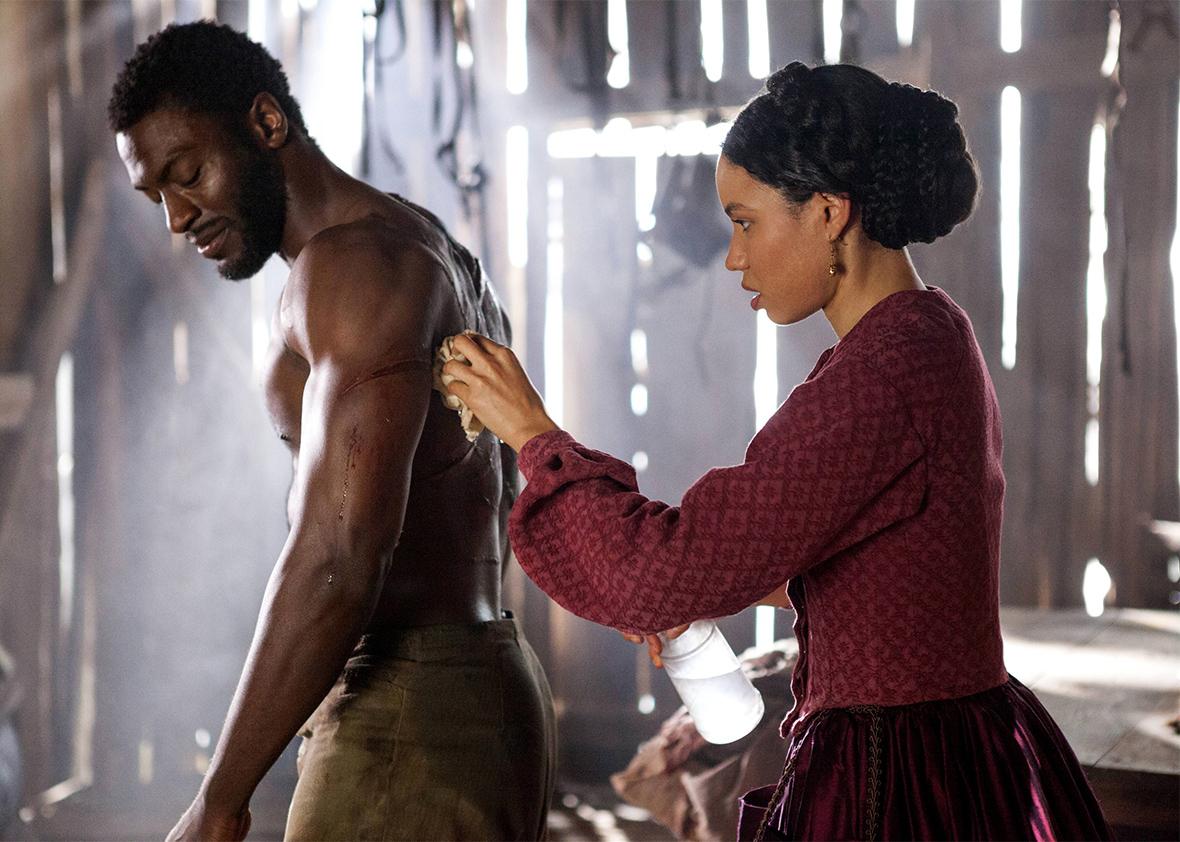Turning historical atrocities into entertainment is a tricky proposition. Doing it on television is trickier still, because most TV, unlike other art forms, still equates entertainment with escapism and fun. Literature, art, theater, and film are permitted, on occasion, to entertain in more painful ways. The pleasures we wring from them can be hard-won and stinging. We turn to these mediums knowing they can hurt, but leave us bettered for having spent time in the company of something excruciating and true. We don’t, historically, turn to TV for this.
One exception to this rule is Roots, the towering and hugely successful 1970s miniseries based on Alex Haley’s novel, which traced a black family from Africa, through slavery, and into the 20th century. (Another example is HBO’s The Leftovers, currently pioneering territory for agonizing television.) And now Underground, a new period drama about a group of slaves running for freedom, hopes to be another. Its timing is auspicious. The series, which airs on the upstart cable network WGN, arrives in the midst of a feverish national conversation about race, on-screen diversity, and the long-term consequences of slavery. Race and racism is Underground’s central subject; its cast is largely, though not exclusively, black; it was co-created by a black woman and a white man; and it is executive produced by the singer John Legend, among others. But Underground’s provocative premise is shortchanged by a corny and anxious tendency to goose the narrative. It is hard to imagine a more inherently gripping premise than escaping slaves, but Underground tosses in pop music, lurid sex scenes, and a breakneck pace, undermining its own ambition.
The show opens as Kanye West’s “Black Skinhead” plays and a black man, a slave, breathing in time to the beat, runs through the undergrowth, trying to evade slave catchers. This is Noah (Aldis Hodge), a field slave alit with the promise of freedom. Returned to the plantation from which he escaped, he gathers together a group of slaves with a plan to travel 600 miles to freedom—in six days time. Underground contains whippings, torture, cruelty, and a woman who drowns her infant son rather than see him live as a slave, but any attempts at realism serve as backdrop for a needlessly frantic plot.
Noah’s group includes Rosalee (Jurnee Smollett-Bell), the show’s other protagonist, and a delicate looking house slave with much inner strength. Rosalee’s mother Ernestine (Amirah Vann) is the head house slave, a position she has sought to protect her children, who include not only Rosalee, but a young boy who may soon have to work in the fields, and Sam (Johnny Ray Gill), a carpenter, who is also part of the escape party. Other would be escapees: a sweet teenager who looks up to Noah; a man who preaches the Bible; his daughter, and his reading, writing wife; a strongman beset by grief; and Cato (Alano Miller), a vicious overseer. Noah’s plan requires that this group gather a number of hard-to-obtain objects—a gun, forged freedom papers—that are assembled with dramatically deflating speed.
Juxtaposed against the slaves is a handful of white people. Tom Macon (Reed Diamond) is the plantation owner and slave master, a Northerner who has fully embraced Southern values in marrying his wife, Susanna (Andrea Frankle), who is even more vilely racist than he. Tom’s brother, in a bit of the soapy coincidence that is typical of the series, is John Hawkes (Marc Blucas), a D.C. lawyer and dedicated abolitionist who, along with his unstable wife Elizabeth (Jessica De Gouw), is approached about using his home as part of the Underground Railroad. Also on hand is Chris Meloni as August Pullman, a slave catcher who should know better.
For every gutting and chilling moment—a little boy ceaselessly fanning guests at a party; a group of leering white men who treat female slaves like whiskey and cigars, a thing they can just help themselves to—there is a cheesy one. A contemporary pop song playing at a party is meant to connect the past to the present, but just takes us out of the past—and into a party that sounds like it belonged on Gossip Girl. A sex scene between the master and one of his slaves is filmed with such lurid silliness that its psychological complications seem campy.
Underground keeps trying to reassure audiences that though its premise is a heavy one, it’s still entertainment. Sex and action are highlighted. The slaves are not just noble, they are mentally intact, unshattered by a perverse and ruinous system aimed specifically at destroying them. It’s significant that this show has one of the rare TV casts composed largely of black people. But Underground does not permit these characters human flaws or faults. Even the brutal black overseer is less awful than he appears to be.
The most memorable sequence in the show involves a black character behaving with reckless abandon and he is just a guest star, appearing in one episode. Jussie Smollett, of Empire, plays an escaped slave who holds John and his wife hostage, even though they are trying to help him. Convinced John had something to do with his wife being sold, Smollet’s character threatens him, sneers at him, derides him, ties him up, and threatens to kill him. The character stands out for being so enraged, so unhinged, so unaccommodating to even these well-meaning white people. It is one of the rare sequences in Underground that feels unruly and unpredictable—when a black character ceases to abide by the bogus standards of good behavior that no one systematically stripped of their freedoms should be expected to obey. For just a few minutes, Underground is not overly concerned with keeping its audience comfortable.
